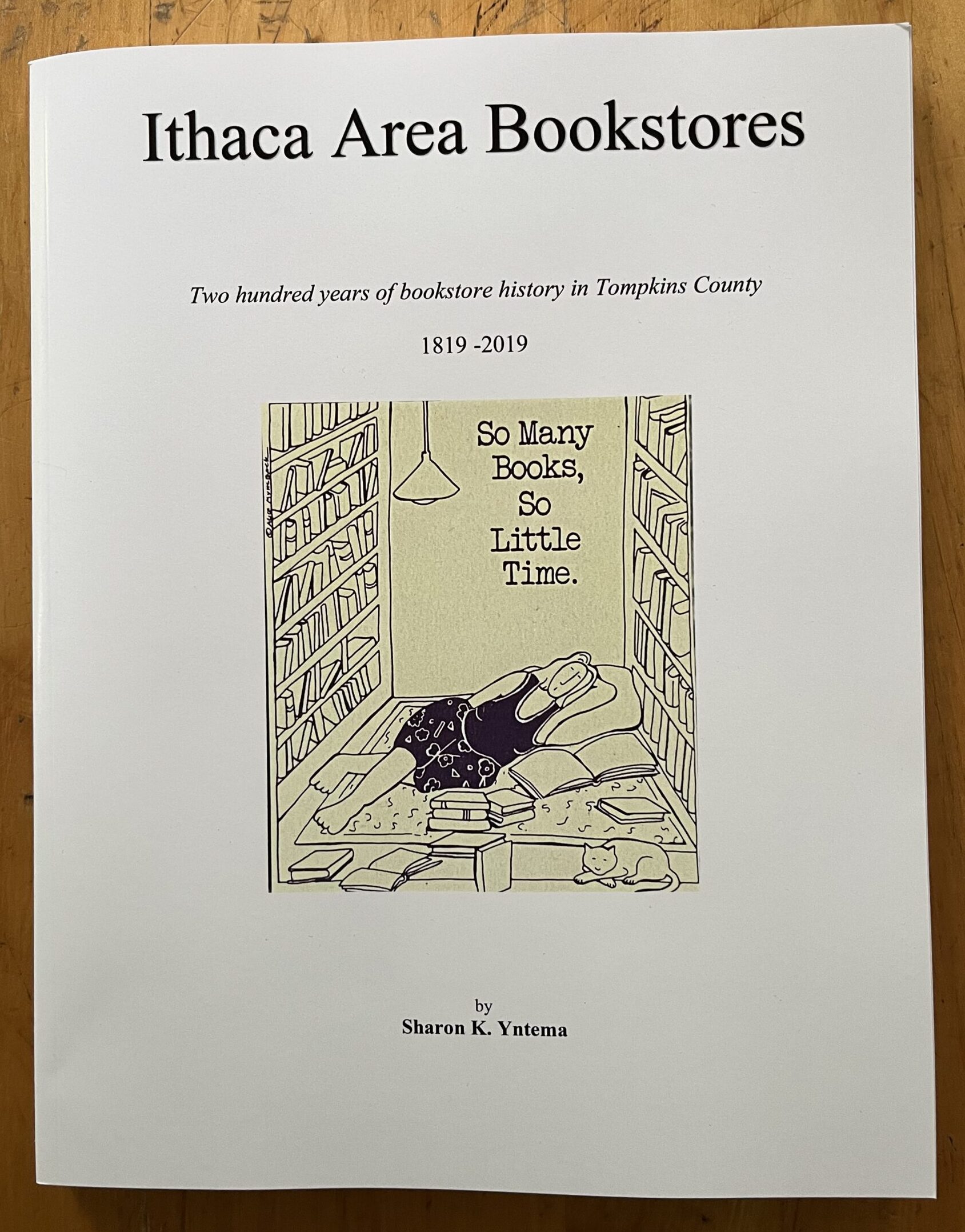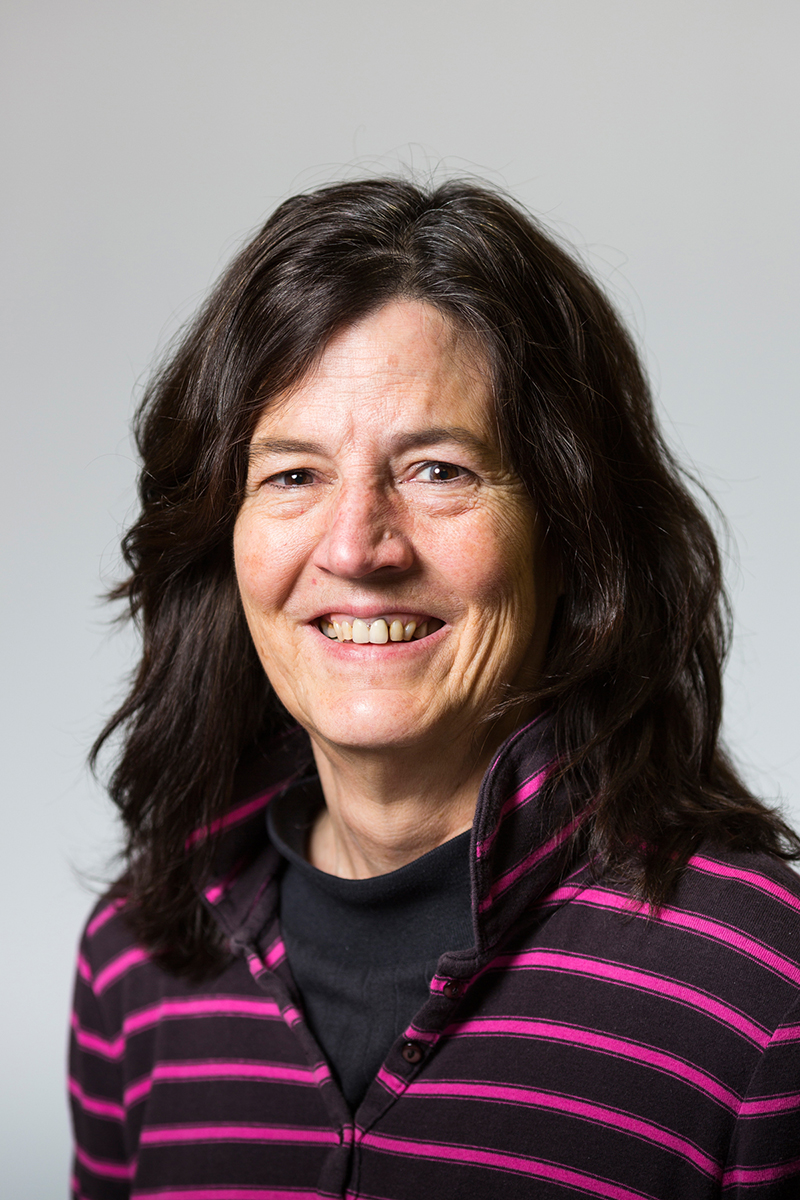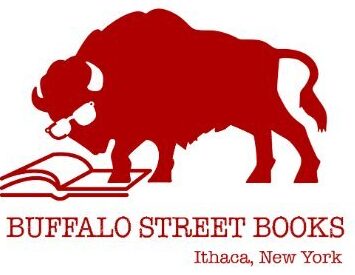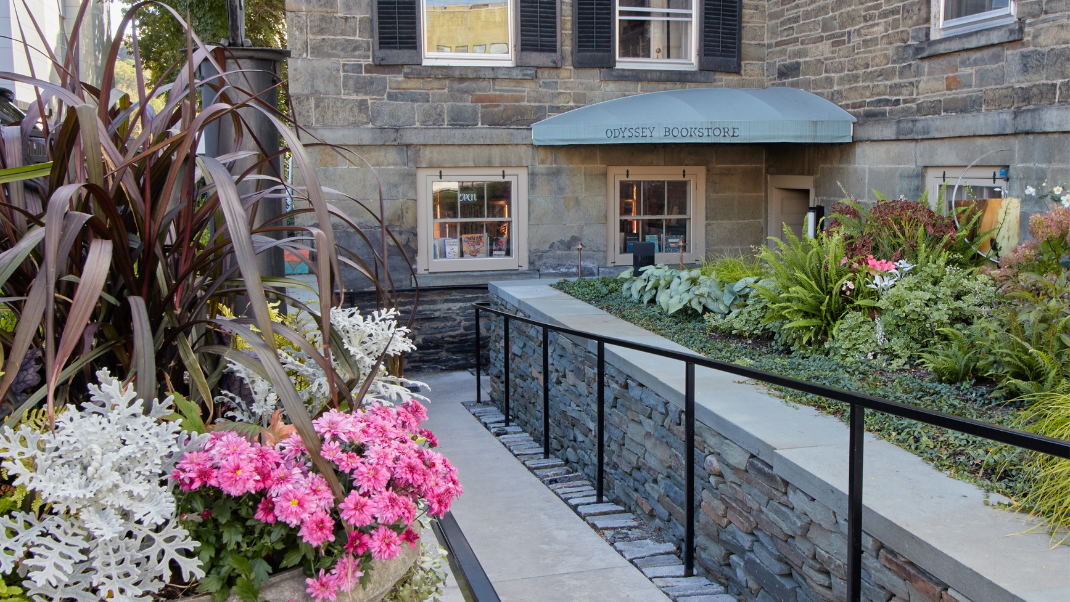 After years of research and writing, author Sharon Yntema has published her latest book, Ithaca Area Bookstores: Two Hundred years of Bookstore History in Tompkins County 1819-2019. A compendium of retail operations dedicated to purveying books offers a history of a reading community through the lens of bookstores. Sharon agreed to an interview about her new release.
After years of research and writing, author Sharon Yntema has published her latest book, Ithaca Area Bookstores: Two Hundred years of Bookstore History in Tompkins County 1819-2019. A compendium of retail operations dedicated to purveying books offers a history of a reading community through the lens of bookstores. Sharon agreed to an interview about her new release.
Q: When were the first bookstores opened in Ithaca?
The first bookstore in Ithaca was opened in 1819 by Ebenezer Mack, who also founded the Ithaca Journal. His bookstore was small, and located in the area where the Tompkins County Public Library now stands. He imported a few books, according to Ithaca Journal ads at the time, but also owned a paper mill and published books at his printing press. Cornell University was founded in 1865, forty-six years later.
Q: How long have you lived in Ithaca and what was the first bookstore you visited in Ithaca?
 I moved to Ithaca in 1975. The first bookstore I visited was McBooks, which was also the first bookstore I worked in. The owner, Alex Skutt, taught me how to do bookkeeping for the store which served me well in jobs over the next 50 years. In 1980, McBooks Press published the first book I wrote, Vegetarian Baby, which was translated into 6 other languages. I owe my introduction to all levels of a bookstore to Alex. [McBooks Press is now an imprint of Globe Pequot, the trade division of Roman & Littlefield.]
I moved to Ithaca in 1975. The first bookstore I visited was McBooks, which was also the first bookstore I worked in. The owner, Alex Skutt, taught me how to do bookkeeping for the store which served me well in jobs over the next 50 years. In 1980, McBooks Press published the first book I wrote, Vegetarian Baby, which was translated into 6 other languages. I owe my introduction to all levels of a bookstore to Alex. [McBooks Press is now an imprint of Globe Pequot, the trade division of Roman & Littlefield.]
I have worked in bookstores since 1978, starting with McBooks. When Alex Skutt decided to open a sister store specializing in science fiction and mysteries (Quest’s End), he asked me to manage that store, which I did for a couple of years before taking a higher paying job since I had become a single mother. In the late 1980’s, Zee Zahava asked me to be her bookkeeper/bookseller when she bought Smedley’s, and I worked there part time for a few years. In 1990, I was hired to be the bookkeeper for The Bookery, and continued to work there and for its offsprings (Bookery II and Buffalo Street Books) until 2020 when the owner, Jack Goldman, retired.
Q: The number of bookstores in Ithaca over the past two hundred years astonishes me. How did you decide what to include and what to exclude in what constituted a bookstore?
In the early days of bookstores, and continuing through today, books were often sold as side items in grocery and other stores. I decided not to include these outlets except as a side note, but focused instead on stores that sold books as their main business. And there were plenty of those over the years. I included every bookstore I found, although details of many short-lived stores have been lost to time.
Q: What are the different kinds of bookstores you discovered in Ithaca’s history?
While chain bookstores have little specialization, local area bookstores were often designed to focus on local interests and needs. Many new and used bookstores helped provide books to students of Cornell University (1865) and Ithaca College (1892). The Corner Bookstore evolved to cater to Cornell students and faculty who came downtown, and was respected for many years for their high-brow selection of books. Specialty stores came into prominence starting in the 1970’s, responding to civil rights and other political issues, such as feminist and lesbian bookstore (Smedley’s), used bookstores (The Bookery, Gould’s Book House, Blue Fox Used Books), and alternative lifestyles (the Shotaway, the New Alexandrian Bookstore, Borealis Bookstore). There were a couple of Christian bookstores (Logos Bookstore, Faith Christian), and of course the Book Sales Gallery which evolved into a pornography bookstore and smoking supplies outlet. Large chain bookstores began to arrive in the late 1970s, although only Barnes & Noble still exists today. Online bookstores began to open the late 1990s. These names only scratch the surface, and all bookstores had their own personalities, which was why it was so much fun to research them all!
Q: I noticed you included the history of how Buffalo Street Books came to be a cooperative 12 years ago. How is a cooperative bookstore different from other kinds of bookstores, and did you find any precedents in Ithaca’s history?
The first cooperative bookstore was opened in 1895 by Cornell students and faculty to provide better prices and selections than the other Collegetown bookstores, Triangle and the Taylor & Carpenter bookstore. This store was incorporated into the Cornell Campus Bookstore after World War II. In the 1800s, bookstores were known by their owner’s name(s), and often changed as a new financial backer was brought into the ownership. For example, Ebenezer Mack, who owned the first bookstore, had several different name changes to reflect this: Mack & Searing, Mack & Morgan, Mack & Andrus.
 Buffalo Street Books became a cooperative in 2011 after sales fell too dramatically once Amazon and chain bookstores moved in. Rather than accepting the loss of such a major downtown independent bookstore, employee Bob Proehl came up with a plan to have a community buy-in to save the store. In this way, anyone could and still can become an owner. Elected Board of Directors helps with oversight and funding initiatives, while other bookstores may come and go depending on the financial stability of the owner. Buffalo Street Books Cooperative encourages owner participation in a variety of ways and hopes to continue to be a long-lasting bookstore under one name.
Buffalo Street Books became a cooperative in 2011 after sales fell too dramatically once Amazon and chain bookstores moved in. Rather than accepting the loss of such a major downtown independent bookstore, employee Bob Proehl came up with a plan to have a community buy-in to save the store. In this way, anyone could and still can become an owner. Elected Board of Directors helps with oversight and funding initiatives, while other bookstores may come and go depending on the financial stability of the owner. Buffalo Street Books Cooperative encourages owner participation in a variety of ways and hopes to continue to be a long-lasting bookstore under one name.
 Q: What is it about Ithaca that makes its bookstores so integral to the community?
Q: What is it about Ithaca that makes its bookstores so integral to the community?
The clearest answer is that Ithaca is a college town. Faculty members and students are no longer served by their college bookstores which now buy only required textbooks. The transient college population has a wider set of intellectual and literary interests than a small town without colleges. In addition, Ithaca has been a center of alternative lifestyles and diversity, and books have always been a source for new ideas and philosophies.
Q: What Ithaca bookstore(s) do you remember that no longer exist?
There are so many wonderful bookstores that closed by the beginning of the 21st century, such as McBooks, the Corner Bookstore (a bookstore that claimed an origin date of 1833, under another name), Borealis Bookstore, The Bookery, the New Alexandrian Bookstore and Snow Lion Books. Mayers Smoke Shop (1897-2014) is an example of a store that carried a good selection of mass-market books along with tobacco products and magazines. In 1980, there were 33 bookstores open, mostly in downtown Ithaca. Today there are only three bookstores downtown: Odyssey Books (the most recent to open), Buffalo Street Books Cooperative, and Autumn Leaves (a large used bookstore, recently bought by PM Press.)
Q: “Ithaca is Books Festival” is coming up soon. Tell us about it and the two upcoming events to hear you speak about Ithaca’s history of bookstores.
 I am so pleased to be able to be a part of the “Ithaca is Books Festival” this year. The festival is back for its third year this August 10-13. Buffalo Street Books, Odyssey Bookstore, PM Press, Story House Ithaca and the Tompkins County Public Library have packed a weekend full of literary events in the downtown area. I have been invited to do a signing in the backyard garden behind Odyssey Books, and another one at the Library co-sponsored by Buffalo Street Books. I am so pleased to be able to be part of the “Ithaca is Books Festival” this year. I think my book will appeal to visitors and old-timers who used to live here in the heyday of local bookstores (1960’s-2000) and am proud that copies of my book are available in the local history room of the Tompkins County Public Library, the History Center of Tompkins County archives, as well as in Odyssey Books and Buffalo Street Books.
I am so pleased to be able to be a part of the “Ithaca is Books Festival” this year. The festival is back for its third year this August 10-13. Buffalo Street Books, Odyssey Bookstore, PM Press, Story House Ithaca and the Tompkins County Public Library have packed a weekend full of literary events in the downtown area. I have been invited to do a signing in the backyard garden behind Odyssey Books, and another one at the Library co-sponsored by Buffalo Street Books. I am so pleased to be able to be part of the “Ithaca is Books Festival” this year. I think my book will appeal to visitors and old-timers who used to live here in the heyday of local bookstores (1960’s-2000) and am proud that copies of my book are available in the local history room of the Tompkins County Public Library, the History Center of Tompkins County archives, as well as in Odyssey Books and Buffalo Street Books.
Q: How can readers get a copy if they aren’t in Ithaca?
Both Odyssey Books (607-269-5800) and Buffalo Street Books (607-273-8246) in Ithaca will ship books. Copies may also be purchased through The History Center of Tompkins County (607-273-8284, ext 229) or email me.
Q: Tell us about your next writing project.
My next book project is tentatively titled The Natural and Unnatural History of My Backyard. It starts when my small plot in downtown Ithaca was under a mile-high glacier. The unnatural history starts in the late 1700s when white men arrived in Ithaca and began to make permanent changes to the Ithaca area, including my backyard. I have lived at my current location for over 25 years, and have kept notes about large and minute changes to this particular piece of land. It’s a fascinating project, and I hope it will be useful as a resource in looking at the history of Ithaca downtown since incorporating as a village in 1821.
Sharon Yntema has worked with Swenson Book Development LLC since 2014 as a bookkeeper and beta-reader. She is the author of Vegetarian Baby, Vegetarian Children, New Vegetarian Baby, Vegetarian Pregnancy, and More Than 100: Women Science Fiction Writers.
